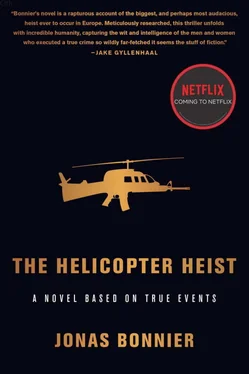“No, it doesn’t work like that,” Sami said, pulling at the neck of his T-shirt. “I made you a promise. You know?”
They understood, but they took no notice of him. Ali changed the subject and started talking about soccer instead. Adil joined in. Sami had nothing to add to a conversation about Chelsea and Arsenal, and he quickly retreated to the silence that his brothers always reduced him to.
They ordered coffee and tiramisu.
It was his older brother, Ali, who had dealt out the roles in their family, in the much the same way as you would deal a pack of cards. It was him the siblings had looked up to during their teens, when they first started trying to find their own identities; he was the one they had feared and admired. But once the others had taken their cards and defined themselves, the pack was dealt, and Sami’s position between his protective older brother and explosive younger sibling was still something he struggled to define. There had been days, moments, when he thought he had finally managed to find an image of himself, but then the outline had quickly lost its sharpness and vanished. All that had been left for Sami was the Joker.
“It has to be over for United now,” Ali said, as though it were a question. “Everything has its time, and Manchester United’s is over. Finished. Done. From now on, it’s all about Arsenal.”
“Arsenal!” Adil shouted, pretending to look shocked. “How the hell can you say that? Arsenal? Did I miss Drogba being transferred?
They laughed at the joke, and Sami laughed with them, though he didn’t know why. He didn’t care about soccer, never had, he was the middle brother who didn’t quite fit in. For a long time during his teens, the solution had been to wrap his hands tight, pull on the boxing gloves and punch his knuckles bloody on sandbags and balls. He had feinted and jabbed at the shadows of a father he could barely remember and who had left behind the mystery of why he disappeared. Then, damp with sweat, his brow split and his rib broken, Sami had been able to slump into the changing room after the fight and, for an hour or two, while his body recovered, experience a peace he never usually felt.
Now, in the restaurant, Sami found himself getting lost in his thoughts. No one, neither his brothers nor the friends who had invested in his plan, had pressured him to repay the money. But he had made each of them a solemn vow that he would get it by autumn. The Stockholm underworld had been his witness. Everyone had heard him say it, and now it was already September.
“Listen to me now, Sami,” Ali said, tasting the dessert that had been more or less dumped onto their table. “I still think you should stick with us. Screw whatever you’ve got planned, it doesn’t seem to be working anyway.”
“We’ve come too far to drop it now,” Sami mumbled.
“Sometimes you’ve got to spend a bit of time on something before you see the truth,” Ali said wisely, giving Adil an encouraging look. The younger brother nodded in agreement.
—
Sami left his brothers in Liljeholmen at eleven and took the subway back to Södermalm. He had been away for most of the past few weeks. There were moments when Karin let him know that, but then there were evenings like tonight.
When he got back to the apartment, both kids were asleep and Karin was sitting on the sofa. She smiled when she saw him.
“What?” he asked suspiciously, taking a few steps into the room.
“I watched a romantic comedy,” she said. “It put me in a good mood and I remembered why I let you convince me.”
“Convince you? How did I convince you?”
“I could’ve kept my clothes on, you know?” she said. “Or at least my underwear. But I didn’t. You convinced me.”
“I’ve got the gift of the gab,” he smirked.
“Maybe. But you’d also poured a lot of vodka down my throat.”
“The two aren’t mutually exclusive.”
He peeled off his coat and threw it onto an armchair. Then he moved over and sat down next to her on the sofa, but he was still on his guard. Over the past few days, he had been worried that she knew what he was planning. On a few occasions, both yesterday and the day before, she had repeated her mantra: that their relationship was built on him not doing anything stupid. And by that, she didn’t mean other women; she wasn’t worried about that. Sami had loved Karin since high school and there would never be anyone else for him. She knew that.
“Why’re you saying that?” he had asked. “I haven’t done anything I shouldn’t.”
“Just a reminder,” she replied.
He hated female intuition.
But now, he put an arm around her and pulled her close.
“I seem to remember,” he said, his face so close to hers that he could smell her lipstick, “that you took off your bra before I even suggested it.”
Karin smiled, wormed her way out of his grip and got up.
“Not the first time,” she replied. “It’s every other time you’re thinking of.”
She pulled her top up, over her head.
On the morning of Wednesday, September 9, Detective Chief Inspector Caroline Thurn left the offices of a business called Panaxia on Linta Gårdsväg 5 in Bromma. There were six days to go until the biggest heist in Swedish criminal history.
Without letting on that the situation was critical, she had spent over an hour in the Panaxia meeting room on the third floor, going over every conceivable scenario with the management team. The room was bright and airy, and low-flying planes passed overhead at regular intervals on their descent into Bromma airport.
For Thurn, the conversation had walked a fine line between revealing too much and making sure she wouldn’t regret anything in a week’s time. If she told them everything she knew, there was a risk the information would be leaked, which could result in the robbers changing their plans. But if she didn’t prepare Panaxia for what might happen and one of the company’s employees ended up getting hurt, she would bitterly regret her secrecy.
Panaxia was on the verge of moving some of its business activity away from Bromma. In exactly one week’s time, on Wednesday. September 16, the move was scheduled to finish, but until then, the company would be more vulnerable than usual, from a security point of view. As a result, it was “positive that the police are showing an appropriate level of interest,” as Panaxia’s security chief put it.
Thurn, who hadn’t known about the move in advance, nodded in agreement.
They had gone over the flow of the building in detail, and when Thurn eventually got up on her long legs to shake hands with everyone in the room, she thought she had found the answer to the question they had been searching for.
She knew where the helicopter robbery would take place.
—
The car was parked directly outside the entrance. As Thurn sat down behind the wheel and fastened her seat belt, the feeling that Panaxia was some kind of provincial cousin to the international G4S welled up. On the one hand, its staff did their best, but on the other, their best wasn’t enough. There was something that didn’t seem right about the country’s second-biggest secure transport company, but Thurn couldn’t put her finger on exactly what that was.
Maybe the robbers had made the same observation?
She started the Volvo and pulled out into the road.
The figure the Serbian informant had mentioned to the police, a haul of up to €10 million, could be found in only three places in Stockholm. The central bank and the two cash depots, Panaxia in Bromma and G4S in Västberga.
It was unlikely that anyone would attempt to rob the central bank. It was one of the few buildings in Sweden that even Caroline Thurn dared call secure, and there was no way you could land a helicopter on the roof.
Читать дальше












